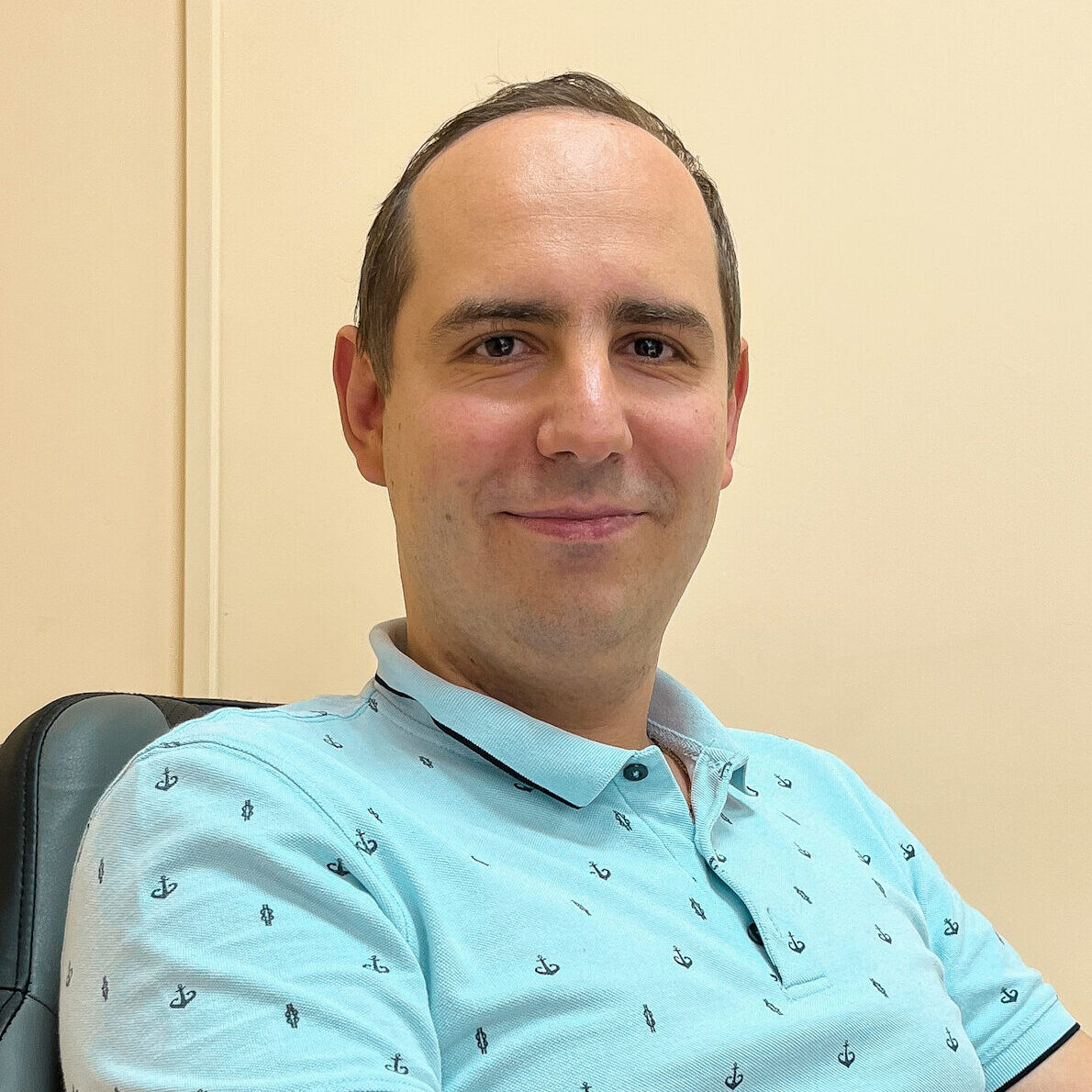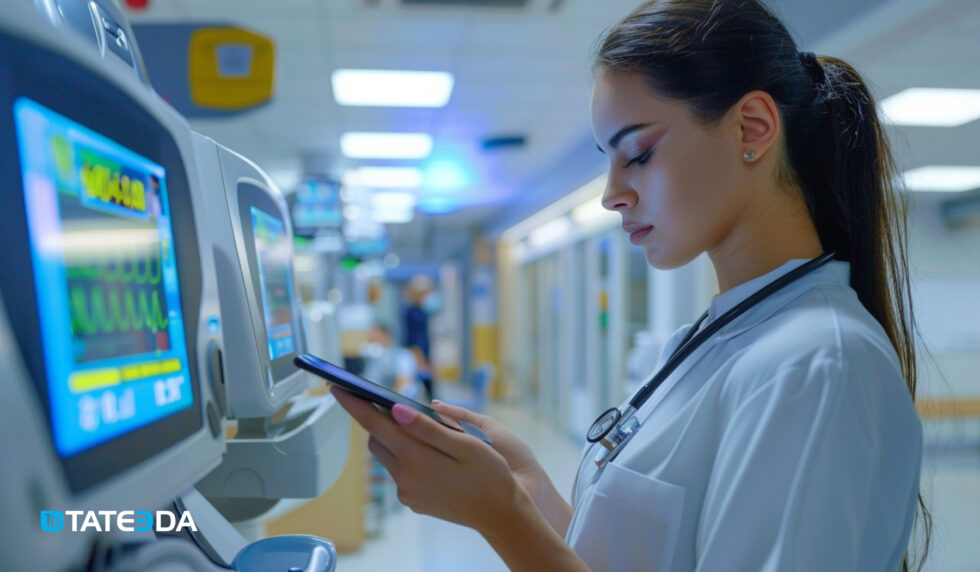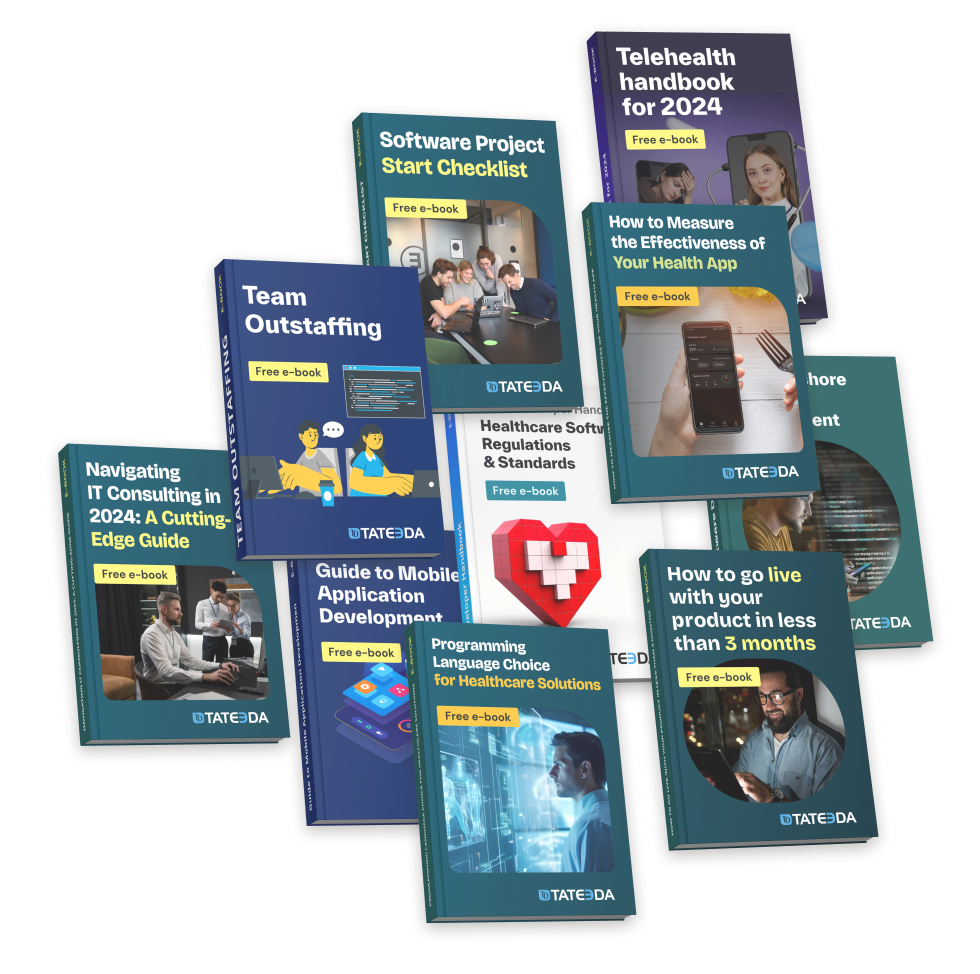mHealth App Development Solutions: The Ultimate Guide & Services for 2025

Smartphones, tablets, and wearables have become integral to the modern healthcare toolbox, with Americans spending 3–5 hours daily on their devices. In 2025, custom mHealth app development will focus on AI-guided virtual care, better patient engagement, and more intensive HIPAA compliance…
With hundreds of thousands of health apps available, only a select few will meet the standards for security, usability, and professional-grade functionality. In this article, we’ll discuss:
- The significance of mHealth apps for the healthcare industry
- How to develop a mobile health app and what it takes
- The average estimated cost of mHealth mobile app development for healthcare
- How to get professional help with this type of app.
| ⚠️ If you require immediate help with the development of mobile applications in healthcare practice, please contact our IT experts for deeper project consultation and more information! |
mHealth app development is extremely popular nowadays: This industry is expected to be worth US $151 billion in 2025—the total number of mobile health apps in mobile app stores has exceeded 350,000. Partnering with a healthcare software development company can help you navigate this growing market and develop a successful mHealth application tailored to your needs.
mHealth (mobile health) means any healthcare practice supported by mobile applications. This term covers not only serious medical applications for clinicians (like telehealth apps), but all sorts of healthy-living/fitness/wellness apps, too.

What makes mobile healthcare app development so important?
In the next section, you’ll see how healthcare mobile app development solves critical challenges and drives revenue in this unique industry. Today, nearly every smartphone user has a couple of mHealth apps on their devices—perhaps a diet planner, a fitness tracker, or a patient portal app that lets you schedule medical appointments and pay bills in moments.
These apps bridge gaps between patients and providers with tools like secure messaging and appointment reminders, reducing missed visits and confusion. For healthcare organizations, custom healthcare application development automates scheduling, streamlines record management, and equips patients with intuitive tools to manage prescriptions, track health goals, and access telehealth app development services effortlessly.
Professional-grade mobile applications are also integrated with medical systems in hospitals and used by physicians or nurses for remote patient monitoring and other purposes. Here you can see an example of a tablet application for remote home-based ECG control for cardiac patients:
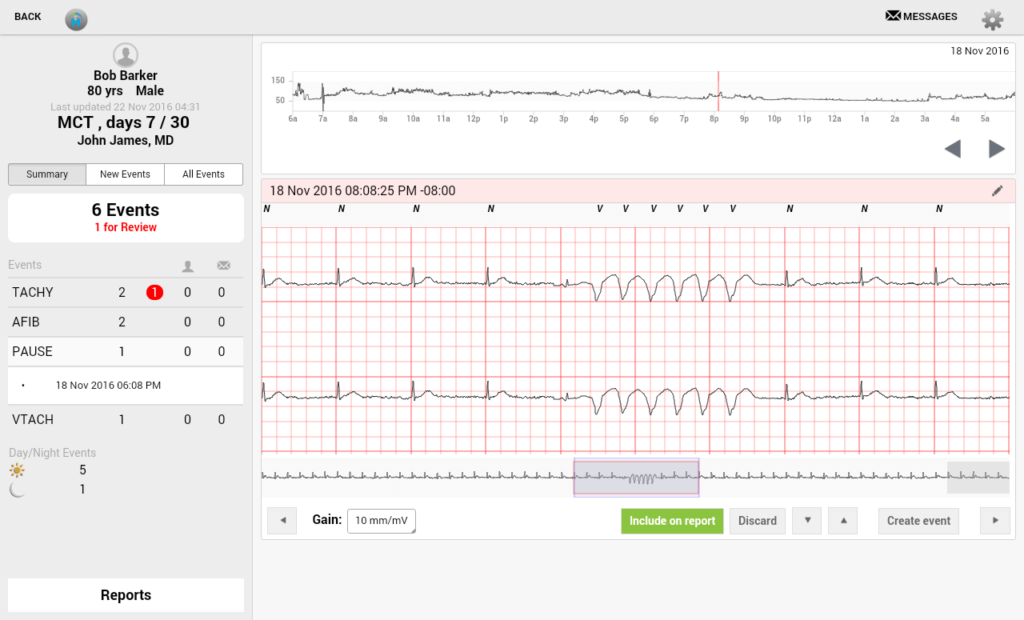
| Who are we? TATEEDA GLOBAL is an IT team with deep expertise in building medical mobile apps for U.S. companies. Our mobile project portfolio includes, but is not limited to: ✔️ Telehealth ECG monitoring mobile apps ✔️ Electronic forms for remote patient surveys ✔️ Patient portal mobile apps and web-based patient portal solutions ✔️ Pharmacy inventory management systems ✔️ Healthcare job-management mobile apps for medical professionals. If you want to discuss your mHealth project specifics or get qualified mHealth app development services and consulting, please book a free chat with our health IT engineers: ? |
Looking for Expert mHealth App Development Solutions?
Since 2013, TATEEDA has delivered HIPAA-compliant mobile health apps with a team of over 100 senior developers, ensuring secure and innovative solutions.
Table of Contents
mHealth App Development Key Trends: the United States and the World
What is an app in healthcare? A healthcare app is a product where medical care meets technology: virtual ideas literally turn into efficient solutions that make life easier for patients and professionals alike.
It’s not just another piece of software installed on your smartphone—it’s a level-up for the device in your pocket that helps doctors diagnose and communicate faster, enables researchers to analyze vast volumes of data in the cloud, and gives patients access to sophisticated remote care whenever they need it!
Designed by expert mobile health app developers who engineer secure and efficient systems, these apps maximize the benefits of digital health and bridge the gap between professional healthcare expertise and the everyday well-being of ordinary patients. For more information read this article about healthcare mobile app development trends.
Why does the U.S. health-tech industry demand custom mHealth app development services so much?
GooglePlay and iTunes offer thousands of options in terms of medical, health, fitness, wellness, and healthcare apps.
Their purposes range from professional/semi-professional medical apps provided by the largest healthcare organizations to simple apps, like daily hydration reminders and other offerings from myriad private mHealth app developers.
A mHealth app development company, like TATEEDA, today operates in a market that’s scaling fast. Valued at $5 billion in 2020, the global medical app sector is set to exceed $20 billion by 2027.
In North America alone, healthcare mobile applications are projected to hit $350 billion, growing at a 45% CAGR. The momentum is driven by remote patient monitoring, online pharmacies, fitness tracking, and AI-powered diagnosis tools—identifying the future horizon of mHealth app development services.
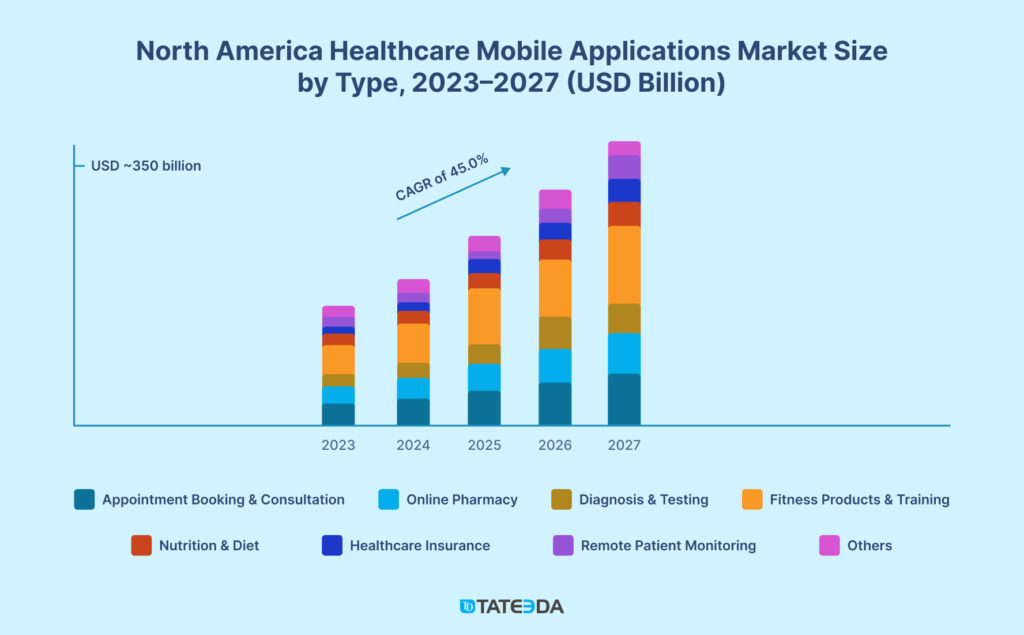
Currently, numerous healthcare providers share their branded apps in application marketplaces, including Mayo Clinic’s apps on GooglePlay. They have developed a group of mHealth mobile applications like professional medical data-management tools and patient portal solutions that feed health news and tips to users.
An even more impressive app library has been developed by Johns Hopkins Hospital. It includes dozens of mHealth mobile apps that range from a baby stool color analysis app to rehabilitation games for patients with brain injuries to professional medical knowledge assistants…not to mention many other hardcore mHealth apps for medical students and mature physicians.
Several factors will drive the continued acceleration of mHealth app development services (building mobile apps for healthcare purposes)—not only in the United States but worldwide, too:
Trend #1: Ubiquitous adoption of mobile devices ?️➡️?
In the U.S., it’s pretty hard to find a person without a smartphone, tablet, or netbook.
Thanks to the availability of affordable smartphone models, these devices are widespread across all segments of American society. 98% of Americans use a smartphone of some type.
That’s why the best way to reach the majority of patients (or potential patients) is to offer them efficient, convenient mHealth app development solutions. Here’s a concept of a patient portal mobile app that lets patients manage their medical records and appointments from their smartphones:
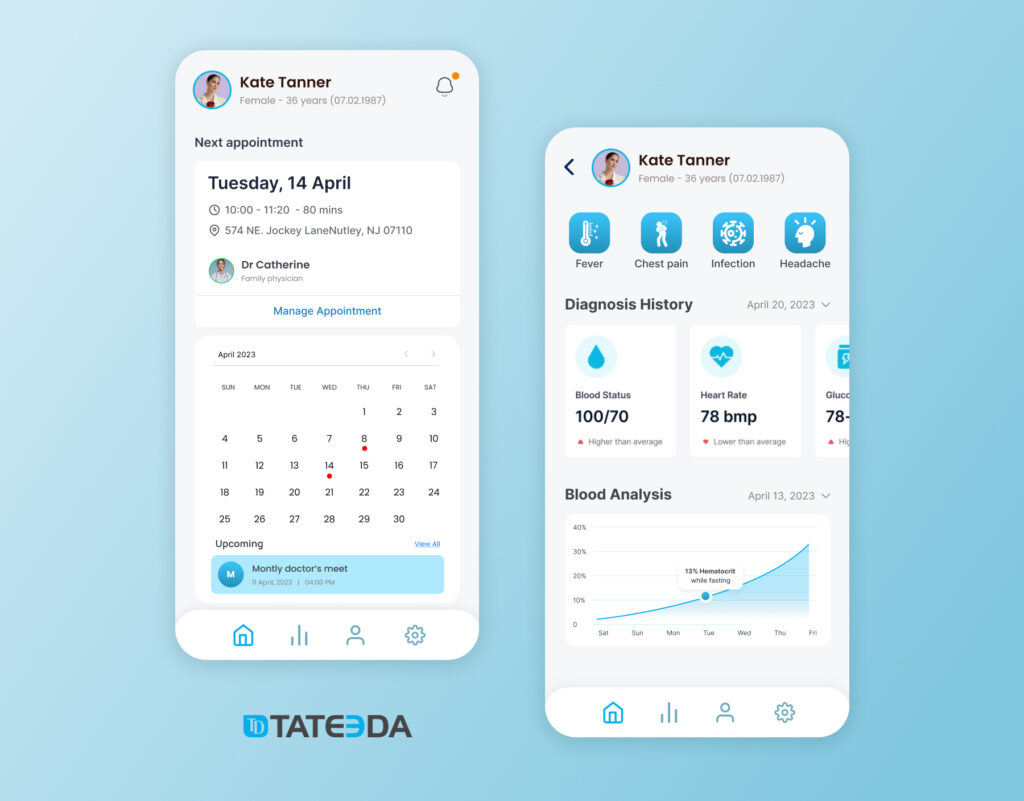
Trend #2: Public healthcare costs are rising—mobile health application development aims to make care more affordable ??
The cost of U.S. healthcare services is only going to increase. Many healthcare providers are trying to manage their expenses with the help of custom HMS solutions and optimization of patient visits to healthcare facilities.
In this context, the adoption of mobile apps allows more patients to stay home from hospitals and clinics if their conditions are not severe or urgent.
mHealth apps allow many healthcare services and functions to relocate from dispensaries and medical offices to the homes of patients. Free mobile apps offered by trustworthy healthcare providers help patients to:
- Manage their symptoms and health conditions
- Collaborate with their caregivers via remote monitoring of signs of vitality
- Schedule medical appointments
- Stay in good shape and maintain proper hydration levels
- Gain access to telemedicine and communicate with their physicians online
- And much more mHealth app development solutions…
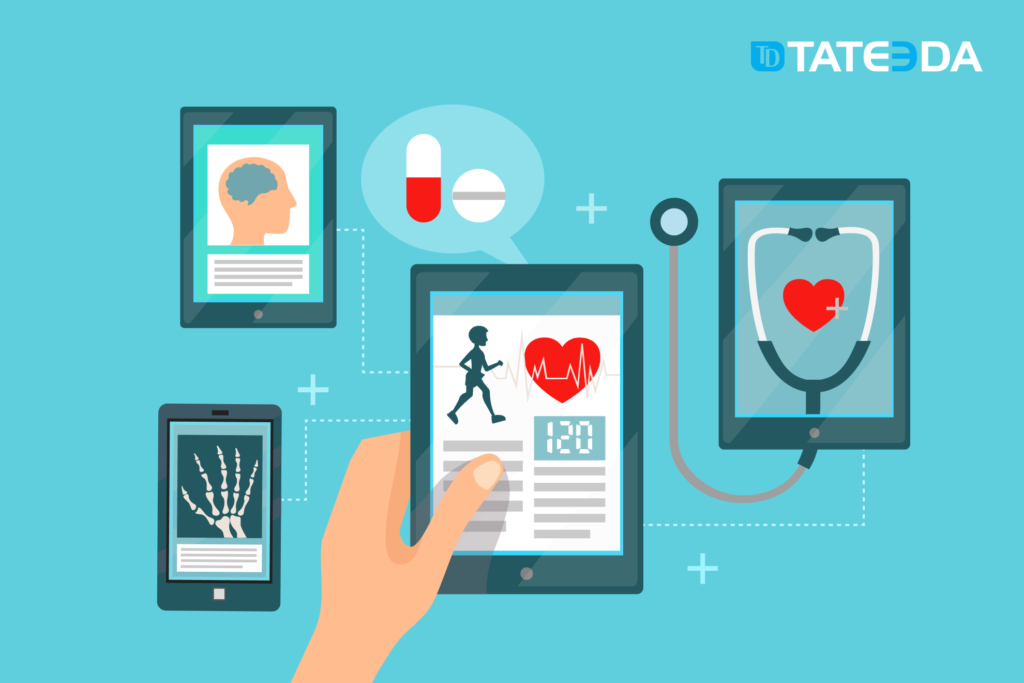
Read also: ➡️ Top 4 Telemedicine Integration Strategies: Guidance from Healthcare IT Consultants
Trend #3: The post-COVID pandemic trends in healthcare app development ??
We’ve moved past the phase where mobile health application development was just a reaction to a global crisis. Right now, the industry is moving beyond traditional methods, embracing a smarter, more connected future. Patients expect virtual access to medical services, and providers are making remote care the norm. The shift is no longer temporary—it’s an irreversible evolution.
With mHealth app development solutions advancing rapidly, people rely on their smartphones for everything from real-time diagnostics to prescription refills. The demand for digital healthcare has fueled a surge in mobile health app developers building smarter, more connected platforms that ensure continuous, data-driven care.
Here’s where the mobile health application development industry is heading in 2025:
- AI-powered symptom checkers – Instant health assessments using machine learning.
- Wearable health tracking – Smartwatches and sensors syncing with EHRs or similar systems.
- Remote patient monitoring – Continuous health data collection for proactive treatment.
- Virtual care ecosystems – Seamless integration of health business offerings for patients (like different tiers of premium healthcare packages), telehealth, pharmacy services, and chronic care management.
- Home-based medical services – Expanding remote diagnostics, lab testing, and virtual consultations.
The healthcare industry isn’t just going digital—it’s going incrementally more digital and more connected.
With increasing expectations for mobile-first, patient-centered solutions, the role of mHealth app development solutions will only grow, ensuring better accessibility, accuracy, and efficiency in modern healthcare.
Are You Looking for an Experienced mHealth App Development Company?
Our mHealth app development company operates since 2013 building mobile applications for the US health tech market.
Trend #4: Medical staff shortages—mobile health app developers step in to bridge the gap ??
It’s long been understood that American healthcare is struggling with a severe deficit of public healthcare workers. Under these circumstances, healthcare apps can help relieve the rising stress put upon medical workers.
The field of primary care and nursing services, particularly general internal medicine, is facing a significant shortage of qualified professionals. Projections from the Association of American Medical Colleges (AAMC) indicate a concerning scarcity of physicians predicted to occur by 2032.
That can be achieved with a combination of better time management via custom medical appointment-scheduling solutions and self-service opportunities via mobile patient portal solutions. The on-demand staffing model in healthcare is a workforce strategy that effectively tackles the ever-changing staffing needs by offering a flexible solution to address gaps and assignments.
This approach leverages technology-driven medical staffing platforms and mobile applications to seamlessly connect healthcare providers and facilities with highly skilled nurses, medical technicians, and other medical professionals who are readily available for immediate shifts or temporary assignments.
Trend #5: People residing in the country or in other remote locations are demanding better healthcare ?️?
People living and working in distant locations often don’t have easy access to medical professionals, and must take long trips to see a doctor or receive any qualified medical assistance.
Telehealth applications with video-conferencing and remote patient health-monitoring features can be of great assistance to this category of users (country-dwellers, sailors, fly-in/out workers, etc.) Below is an example of mobile health app development concept: a senior-care application including an emergency (SOS) button, video-call feature, medication reminder, and a location-tracking tool.
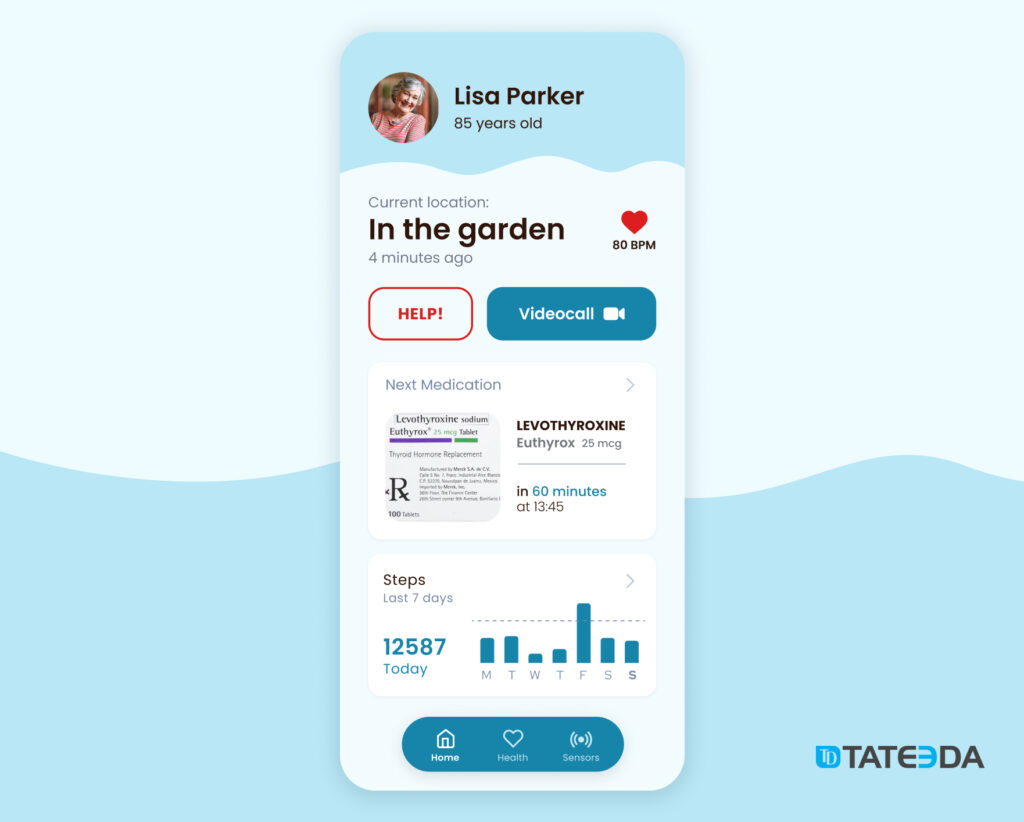
Are you looking for a mHealth app development partner?
As you can see, there is an abundance of positive factors that will keep pushing the development of medical apps in all niches and regions. Now is the best time for you to develop a mobile app for your healthcare practice or facility.
TATEEDA GLOBAL is a California-based company with vast experience in building custom mobile apps for healthcare purposes. If you’re looking for mHealth app-development services but don’t know where to start, be sure to contact our healthcare IT experts for a free chat: ?
Get Assistance with Mobile Health Application Development Today
Our team operates a pool of over 100 senior developers ready to help you with mobile health application development.
The Major Categories of Custom mHealth Apps Development
Mobile healthcare apps can belong to countless categories based upon their specific medical purpose or the business models for which they were built.
There are several major branches of mHealth apps:
Category #1: Professional-grade apps ?⚕️?
This class encompasses mHealth app solutions used by public health workers for supervising patients at home, including remote monitoring of vital signs and other health metrics via medical IoT technology.
These healthcare app development products are usually coupled with medical tracking devices (biosensors) worn by patients at home. They send the bio-signals they capture to server applications that accumulate, prepare, and render health data for physicians and other authorized healthcare workers.
Read also: ➡️ Remote ECG-monitoring Software Development
Category #2: Professional and semi-professional apps ?⚕️?
These mHealth app development solutions are used by patients to control and manage their health conditions without constant supervision from medical professionals.
These types of mHealth apps range from simple pill reminders and medication organizers to more sophisticated mobile solutions like these:
- Apps connected to smart implants
- Fall detectors
- Automated insulin-injection pumps
- Smart inhalers
- Smart thermometers
- Blood pressure monitors
- Remote spirometers
- Sleep trackers and smart mattresses
- Continuous glucose monitors (CGMs).
Below, you can see a conceptual product that can be built with the help of our healthcare mobile app development services: an individualized medication reminder tool with medication plan tracking and vivid instructions on each prescription drug to be taken by a patient.
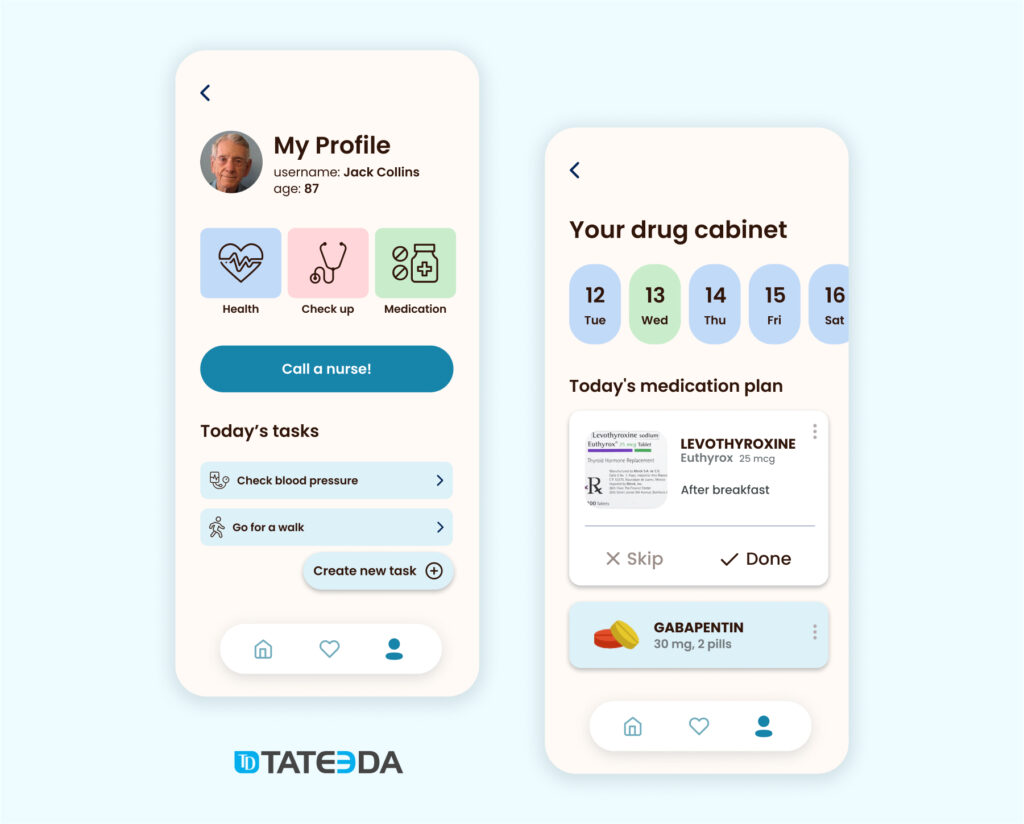
Category #3: Healthy lifestyle apps ?♀️?
These mHealth apps do not fall under medical certification requirements and/or do not comply with strict standards for data safety, including HIPAA compliance. This category includes fitness trackers, diet management apps, calorie calculators, hydration reminders, etc.
Category #4: Self-diagnosis apps and medical chatbots ??
Some mobile apps can help patients learn about their physical and/or mental health conditions before they are able to see their physician.
These types of mobile solutions usually work as smart, dialogue-based guides (chatbots and digital assistants) empowered by mHealth app developers via AI-aided cloud platforms.
They lead you through self-diagnosis by asking a series of questions to clarify your health metrics: body temperature, blood pressure, blood glucose levels, and more. They also help you estimate pain level and other subjective feelings.
This type of app can provide you with a preliminary diagnosis, suggest a scenario of best next steps, and provide quick-relief recommendations, if possible.
Communication apps are provided by specific medical services and healthcare facilities. This type of app includes:
- Multi-functional patient portals with physician schedules, news, and more.
- Basic health navigators (medical record browsers, electronic medical vocabularies, medical practice guides, etc.)
- Medical appointment-scheduling client apps
- Electronic medical data-capture solutions required to control the quality and efficacy of medical treatment or services for a specific patient.
mHealth Apps for Medical Administration, Pharma, and Biotech + Their Features
Before exploring different products available through custom mobile health application development, check out how to make the process easy and effortless for you…
At TATEEDA GLOBAL, we are experts at creating different types of healthcare-related mobile apps, including branded apps for specific healthcare providers, health data visualization solutions, and custom biotech application development. Learn more about our mHealth app development services: ?
Custom Healthcare Solutions
See how we can engineer healthcare software, validate your ideas, and manage project costs for you.
We would like to share our vision of essential features specific to a few of the most in-demand mHealth application categories…
#1. Mobile Apps for Medical Laboratories ??
Labs aren’t just about test tubes and microscopes anymore—they’re digital, connected, and mobile-optimized for efficiency. mHealth app development services introduce a great array of innovations for laboratory management apps (LIMS), like seamless EHR synchronization, biometric authentication, and AI-analyzed diagnostic results.
With FHIR-based interoperability, blockchain-secured data sharing, and cloud-native medical app architecture, lab apps are evolving into powerful tools for researchers, healthcare providers, and patients alike. From real-time test result visualization to multi-format exports and automated notifications, mobile-first lab solutions are making precision medicine faster, smarter, and more accessible. The key features of laboratory management apps (LIMS) include:
- Protected access for authorized users (patient portal)
- Patient profiling (for bonus program management, billing processes, potential synchronization of results with EHR, and more)
- Visual instruments and document viewers to represent lab test data/results within the app
- Ability to export options for downloading test results in multiple formats
- Protected data-sharing options and mechanisms
- Notification options.
Read more: ➡️ Laboratory Test Machine Software Development [Case Study]
#2. Mobile Apps for Drugstores and Pharmacies ??
The most important pharmaceutical mobile applications can have the following features (if we are talking about apps provided by pharmacy chains to their patients):
- Protected access for authorized users (patient portal)
- Patient profiling
- Maps showing the nearest drugstore locations and routes to pharmacies
- E-prescription management tools and export options
- Medication deliveries and refill history
- Medical reference book
- Medical delivery tracking
- Electronic billing
- Notification options.
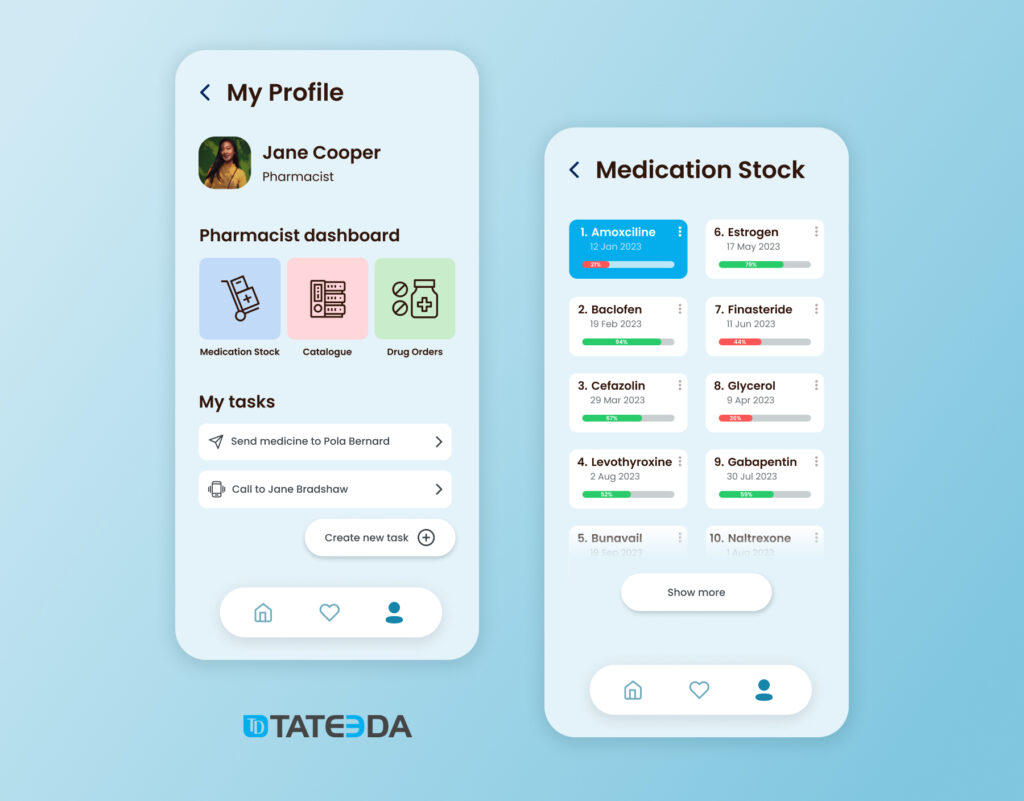
#3. Mobile Apps for Medical Centers and Clinics ??
Apps of this type are developed on behalf of medical centers, clinics, and hospitals to assist their patients in receiving an array of services remotely. Learn more: ➡️ Mobile Hospital App Development: the Ultimate Guide. mHealth app developers can heavily pack these solutions with useful features:
- Protected access for authorized users (patient portal)
- Access to personal health records, drug prescriptions, etc.
- Patient profiling (usually includes custom integration with EHR/EMR systems)
- Distribution of content, news, and information produced by healthcare facilities
- Tools that allow patients to secure convenient time slots and schedule appointments with physicians, dentists, chiropractors, and other health specialists
- Capabilities related to identifying the nearest medical care points; street navigation
- Billing and insurance management. Read more: Healthcare Payroll Software Development: The Complete Guide.
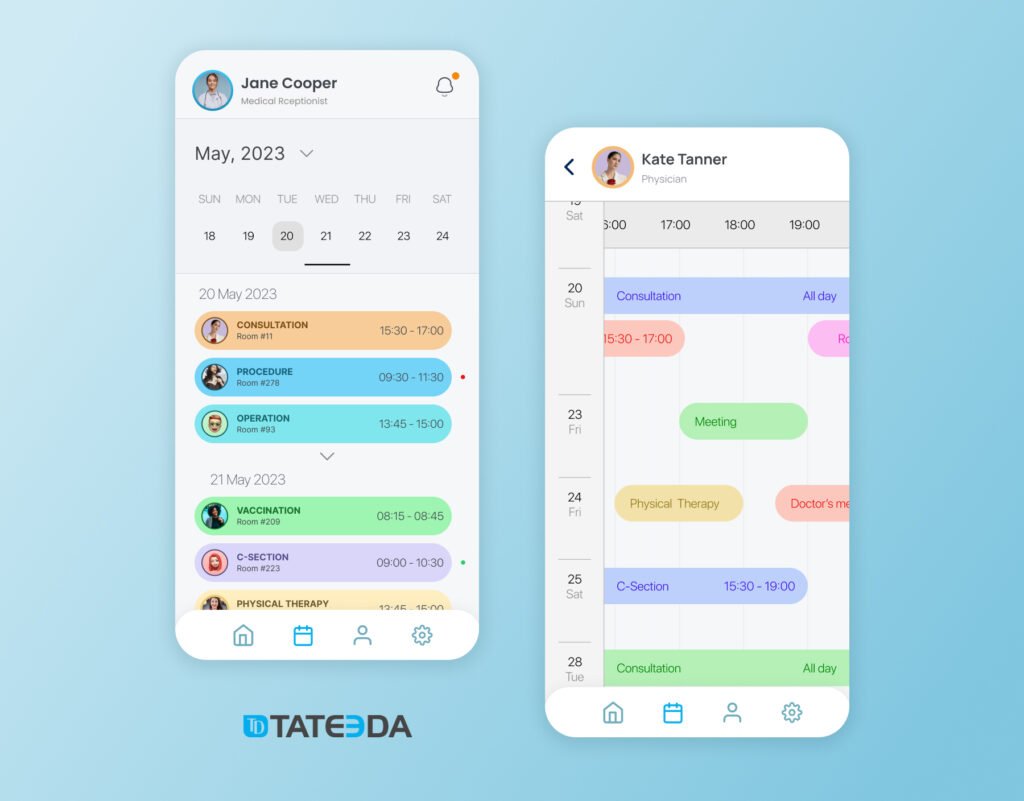
Learn more: ➡️ Medical Billing Software Development Services
Custom mHealth App Development & Architecture: The Details
Ready to start your own project in the field of mobile healthcare app development solutions?
If you want to keep things convenient, hire TATEEDA GLOBAL as your custom mHealth app-development partner based in San Diego, CA. We have been constantly improving our expertise in the field of mHealth app development services since 2013.
Working with seasoned mobile health app developers offers advantages beyond just technical capacities:
- Work with healthcare IT professionals who understand HIPAA, HL7, and FHIR compliance, making it sure your mobile health application development products meet regulatory standards from day one.
- Get to market faster and smarter with proven custom mHealth app development workflows and pre-tested API-based integration architectures that reduce trial and error.
- Avoid security blind spots in mHealth apps development with built-in cybersecurity protocols that safeguard patient data against hackers, breaches, and compliance risks, including Oracle Cerner or Epic EHR integration with APIs.
- Partnering with an experienced mHealth app development company allows for fluid cross-platform compatibility of medical apps on iOS, Android, and the web using React Native, Flutter, or .NET Xamarin, reducing costs and coupling this with high performance and consistency across all devices.
- Scale projects effortlessly—expand your healthcare app development team when needed or introduce rare/senior talent for complex custom mHealth application integrations.
- Keep your mHealth app secure and high-performing post-launch with continuous, natively designed updates, maintenance, and codebase/backend diagnostics to prevent downtime.
If you want to tackle your project with your own IT team, be sure to create a plan that covers the following:
Business Logic Inside Your mHealth App
- Create a schema that represents the business logic of your medical app
- Hire a mobile app engineer capable of designing the technology stack: mobile front-end and back-end technologies, client-server architecture, and more
- Identify all security requirements and tools needed to protect app users and their data. You can learn more about secure SDLC in this article.
- Plan and control the project using Agile methodology.
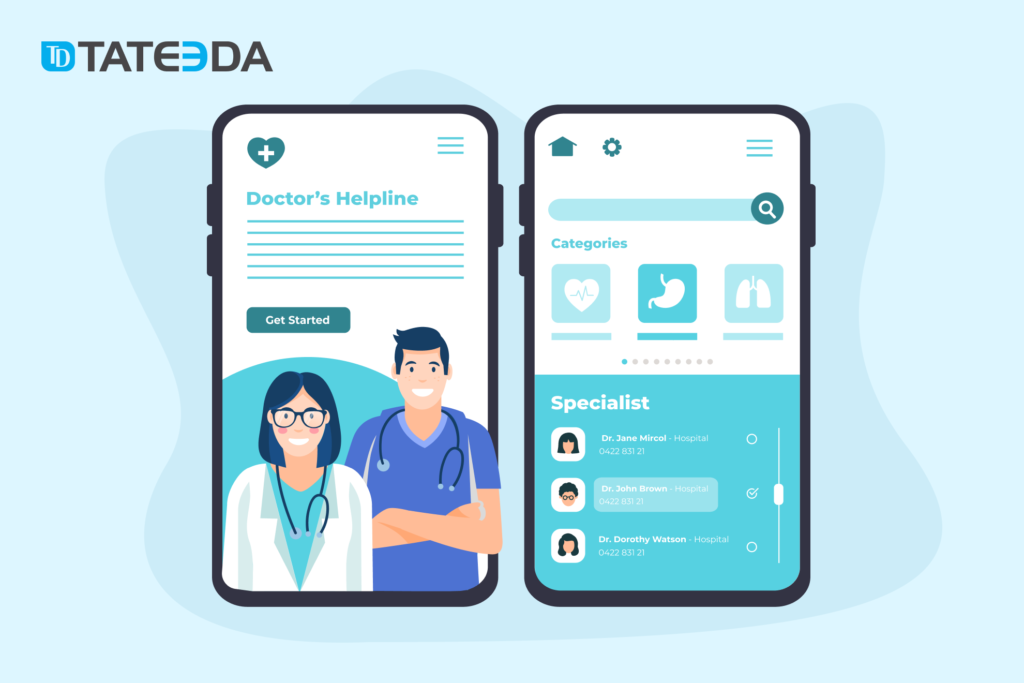
Medical/Healthcare Mobile App Front-End
- The mobile app front-end is the native app UI end-users will interact with.
- Make sure the UI is well-organized, clean, fast, and responsive.
- Involve a skilled UI/UX specialist capable of designing app interfaces, and take into account all healthcare-related specifics.
- Identify all up-to-date technologies needed to build an efficient mHealth application: for example, Flutter powered by Dart programming language.
- Hire a mHealth developer who can complete all required front-end jobs for you.
Learn more: ➡️ Health Insurance App Development Guide
Medical/Healthcare Mobile App Back-End
- Identify the database and server-side services/objects needed to power the functionality of your application.
- Design the API integrations involved in the process
- Hire a mHealth app developer who can integrate all necessary services and platforms to ensure smooth interaction with back-end objects
- Involve QA specialists to test the app in a range of situations to catch and fix the majority of bugs.
Healthcare Mobile App Development Tech Stack
| Component | Technology Stack | Role in Process |
|---|---|---|
| Front-End Development | Flutter (Dart) / .NET MAUI / Angular | Enables mHealth app developers to create a responsive and user-friendly mobile interface with smooth navigation and performance. |
| Back-End Development | .NET Core / Node.js | Handles business logic, processes data, and interacts with the database to deliver requested information. |
| Database Management | SQL (PostgreSQL, MySQL) | Stores patient records, medical history, and appointment data while ensuring quick retrieval and secure storage. |
| API Integration | RESTful APIs, GraphQL | Enables safe data exchange between the mobile app, databases, and third-party services (EHR, payment gateways, etc.) |
| Cloud Services | AWS (S3, EC2, Lambda), Azure (App Services, Functions) | Ensures scalability, high availability, and reliable infrastructure for hosting the application and storing medical data. |
| Security & Compliance | HIPAA Compliance, OAuth 2.0, JWT, End-to-End Encryption | Allows mHealth app engineers to implement security barriers to protect sensitive healthcare data and ensure regulatory compliance. |
| Testing & Quality Assurance | Automated & Manual Testing (Selenium, Appium, Postman) | Identifies and fixes bugs, ensures app stability, and guarantees smooth operation across multiple devices and scenarios. |
| Project Management | Agile, Scrum, Jira, Confluence | Lets mHealth app developers manage custom medical application development workflows, assigns tasks, and ensures timely delivery of the project. |
Learn more: ➡️ How to Build an MVP for a Healthcare Product
How to Make Your mHealth App Compliant?
There is a body of medical data regulations and standards that mHealth developers need to follow in order to achieve optimal security and governmental compliance.
For the majority of healthcare apps, HIPAA requirements must be respected by mHealth app development company, as secure storage and communication of patient information and health records is no joke in the U.S. The law strictly protects patient rights, and violations are punished with painful fines.
Professional apps should go through ISO certifications. Others should, at the very least, meet a combination of the following requirements:
- Privacy-management regulations (CCPA and other regulations)
- Data encryption (end-to-end encryption)
- Multi-factor authentication for accessing sensitive data (e.g., PHI)
- Medical system interoperability
- An in-app session expiration policy (automatic termination of the authorized session when the app stays idle for a period of time)
- Compliance with the policies of the Apple App Store or Google Play, if you’re going to introduce your healthcare app to a wider audience
- PCI-DSS compliance for secure online payment system integrations
- Internal quality and security assurance procedures for medical software
- And much more…
Learn more: ➡️ The Benefits of Healthcare IT Outsourcing for Your Medical Facility
mHealth App Development Challenges
A host of concerns and considerations must be taken into account before you start developing your mHealth app:
Challenge #1: Security and privacy. As mentioned earlier, the protection of medical records and PHI is of utmost importance—a skilled software engineer should be involved in the process and make sure absolutely no security gaps are left behind.
Challenge #2: Complicated/cumbersome UI. Medical apps should be well-adapted to the needs of key user segments. For example, apps intended for use by elderly patients should contain easily readable buttons and an enhanced level of process automation.
Challenge #3: Technological specifics of mobile devices. If an app is designed for a specific age group—or any other group sharing similar demographic traits—it’s necessary to do research and understand which mobile device models are predominantly used within that targeted group. This helps to radically decrease adaptability and incompatibility issues.
Challenge #4: Healthcare legislation compliance: Developing an application in full compliance with HIPAA is one of the main challenges you’ll need to address, and it takes a lot of effort. Experienced mHealth app development companies like TATEEDA GLOBAL can accomplish this task more quickly. If you’re looking for a U.S.-based partner, ➡️ contact us today for a free consultation.
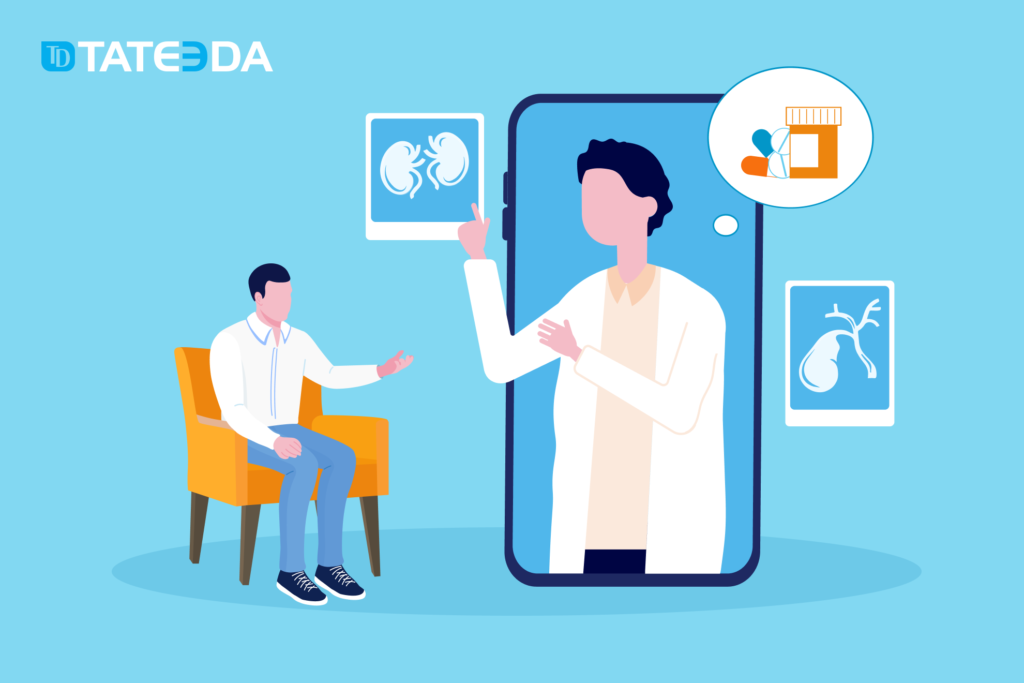
TATEEDA GLOBAL’s Experience in Custom Healthcare Mobile Development Solutions
TATEEDA GLOBAL features a deep knowledge of medical app development.
Our team is capable of building efficient mHealth applications for mobile devices and/or project augmentation. TATEEDA GLOBAL offers a team of mHealth developers, UI/UX designers, project managers, QA specialists, and other software specialists capable of delivering full-cycle turnkey mHealth app development solutions end-to-end.
We are committed to making the entire process simple for you:
- Share your ideas and goals with us.
- Receive complete IT consulting and a mHealth app development estimate.
- Let us handle the complex technical aspects, including software architecture, tech stack selection, project management, coding, QA, and more.
- Enjoy your ready-to-go mHealth app solution.
Here are a few of our previously delivered mHealth app development solutions:
Travel Nurse Healthcare: We designed and created three distinct mobile apps (workspaces for different user groups) to support their large web-based travel nurse management platform with a great range of functions/features.
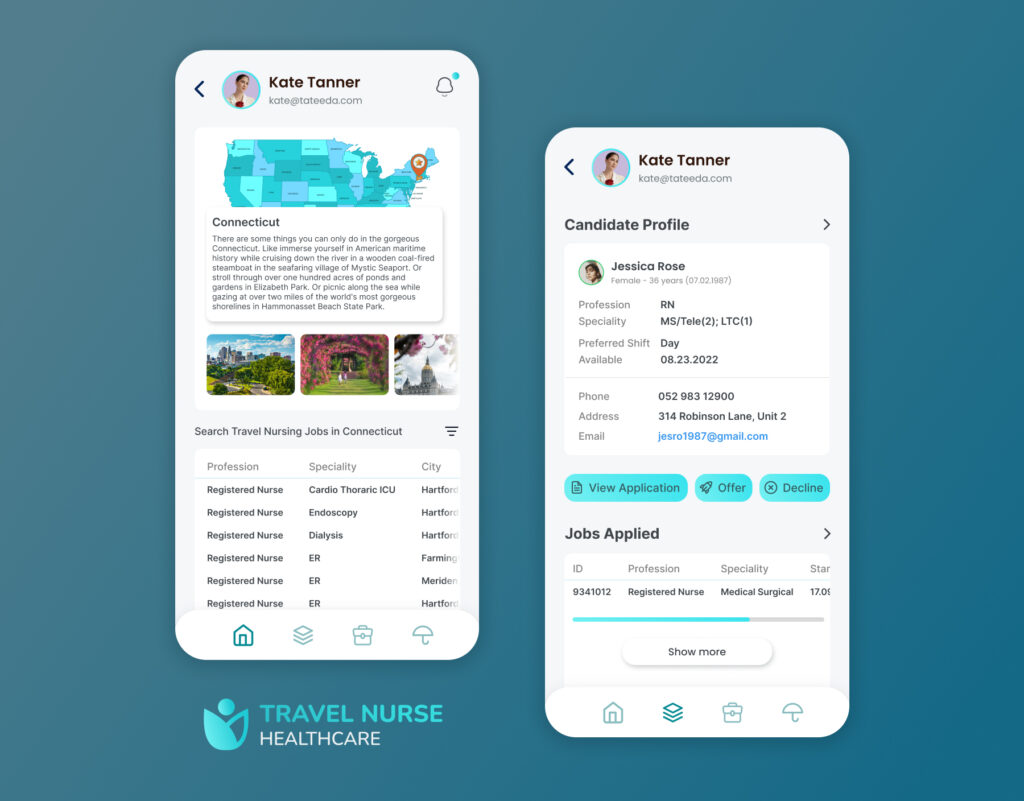
La Maestra Community Health Centers: Our mHealth app development company created a patient portal app with a set of helpful features: healthcare services, enhanced visibility/accessibility for La Maestra’s services and locations, in-app managed content/news, and much more.
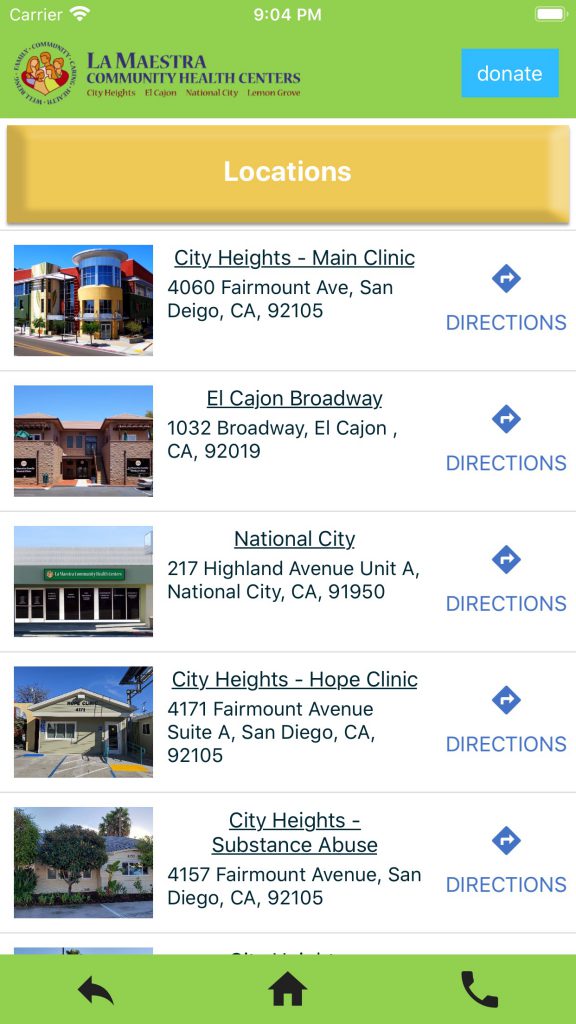
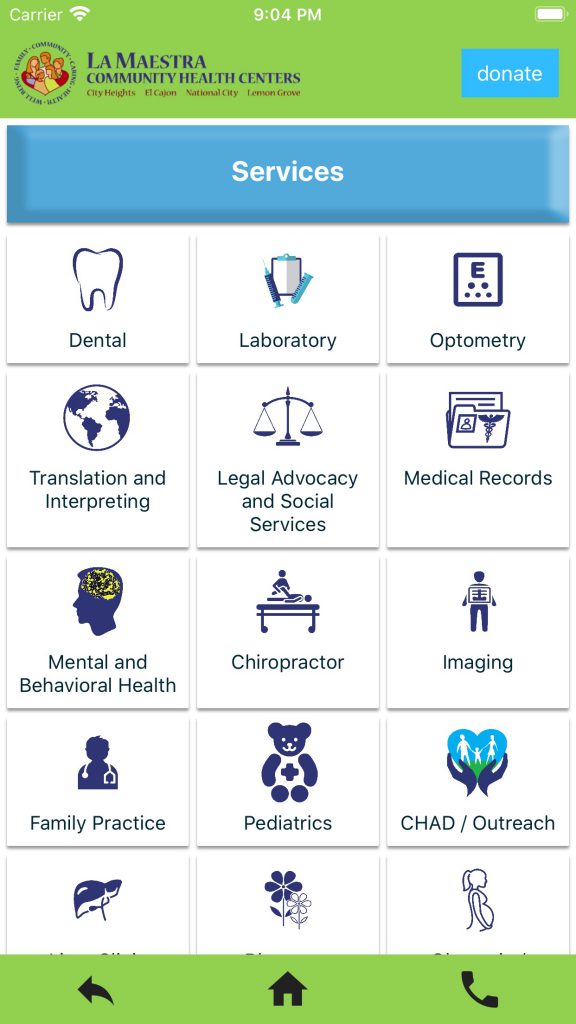
VentriLink: Remote ECG-monitoring app coupled with a biosensor device to capture patient data. The app we created allows physicians to check heartbeat patterns over periods of time, identify signs of arrhythmia and other abnormal phenomena, and much more.
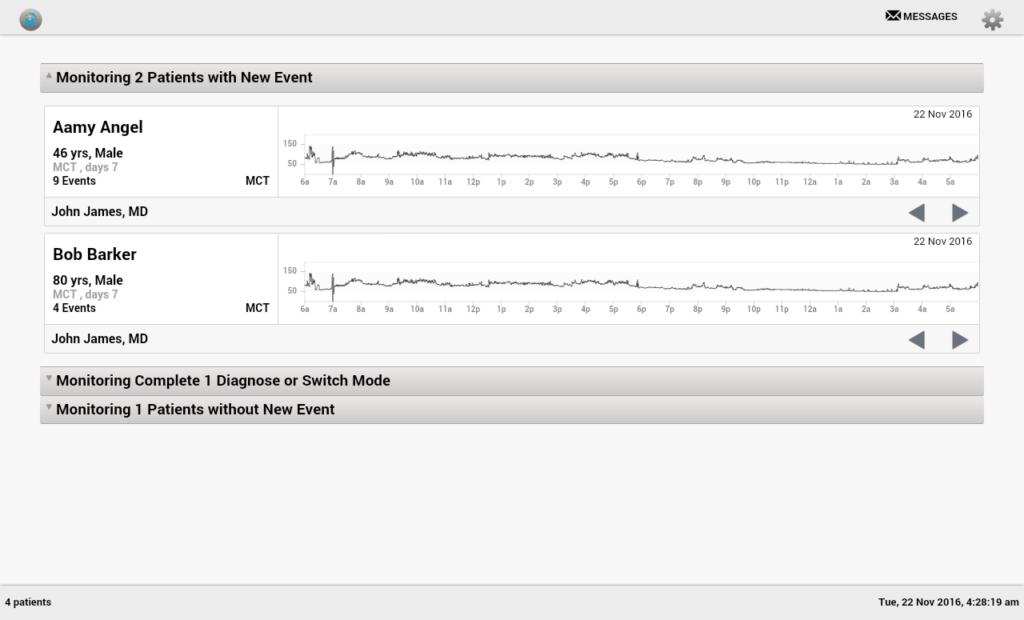
Read also: ➡️ Cardiology EHR/EMR Software Development: Benefits and Features
If you want to work with us on your next mobile healthcare app development solutions, please contact us for a free consultation.
FAQ: What’s the Estimated Cost of mHealth App Development Services?
What is the estimated duration for custom mHealth app development?
Development of a healthcare mobile app solution can take about 3 months, on average (this is a rough estimate.) More time can be reserved for additional code polishing, testing, and ongoing maintenance (supporting and updating the app according to a long-term plan.)
What is the estimated team composition for mHealth app development solution?
A minimal team usually includes between one to three developers, one to two QA specialists, and a project manager—although the configuration can vary as the project advances.
What is the estimated cost of mHealth app development services?
Based on the technologies and components involved in custom mHealth application development, hiring and managing a team of specialists in the U.S. can be a costly undertaking. The estimated cost of a typical mHealth app-development project can reach $80-100K or more.
How can I achieve the optimal estimated cost for mHealth app development solutions?
If you opt for an experienced mHealth app development company like TATEEDA GLOBAL, which has R&D branches for cost-efficient mobile health app development, you can significantly optimize your project costs—that is due to proven custom mHealth application architectures and streamlined team processes.
Our minimum estimate is $30-50K per medical mobile app development project. PLEASE NOTE: More specific and accurate estimates will be given according to your individual project details. Learn more about our successful custom mHealth application projects: ?
Delivered Healthcare Software Portfolio
The leading American healthcare companies benefit from working with us.
In Conclusion: Healthcare Mobile App Development in the U.S.
Healthcare mobile app development services are in high demand. So are qualified, experienced IT partners that can offer you mHealth apps development services and solutions covering legal compliance and integration with Cloud, AI, and other up-to-date mobile technologies.
If you need a professional mHealth app development company to help you build a custom healthcare mobile app or reinforce your existing mHealth projects, TATEEDA GLOBAL is here for you!
We offer:
- Full-cycle mobile app development in San Diego, California
- Medical app project assistance, augmentation, and product testing
- mHealth app upgrades and reengineering
- Compliance with HIPAA requirements and regulations
- Affordable project costs, thanks to our R&D branches in Ukraine and other countries
- Personalized connection with our project managers: HQ in San Diego, CA
- Vast onsite experience with U.S.-based IoT, healthcare, biotech, and pharma businesses
- Fast team deployment—within 48-72 hours
Contact TATEEDA GLOBAL today to start creating the medical applications of your dreams!

